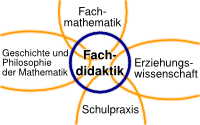Prof. Dr. Daniel Thurm - Research
Research areas
My research focuses on digital formative assessment, game-based learning and teacher professional development in the context of teaching mathematics with technology.
Current projects
- BASE
Project partners: Bärbel Barzel (University of Duisburg-Essen), Stephan Hußmann (University of Dortmund)The BASE project focuses on the design of a digital formative self-assessment tool to foster students’ basic arithmetic competencies. The BASE-Tool incorporates dynamic multiple representations and adaptive feedback and focuses on scaffolding students’ self-assessment competencies to support learners in taking responsibility for their own learning. The research project follows a design-research paradigm and aims at developing a digital learning environment and advancing subject-specific theories about digitally enhanced self-assessment.
Further information: https://base.dzlm.de/
- SMART (Specific mathematics assessments that reveals thinking)
Project partners: Bärbel Barzel, Florian Schacht (University of Duisburg-Essen), Ulrich Kortenkamp (University of Potsdam), Kaye Stacey, Linda Ball (University of Melbourne)The SMART-Test (Stacey et al. 2009) is an intelligent online environment that provides teachers with an automated diagnosis of their students’ stages of development, individual students’ errors, and misconceptions. The project investigates the effects of using the SMART test with respect to students’ learning, teachers’ formative assessment competencies, and teachers’ formative assessment practices. - ISAA (Interplay between self-assessment and automatic digital assessment)
Project partner: Shai Olsher (University of Haifa)It is well established that digital formative assessment can support student learning, for example, by means of digital automatic assessment of students' work in rich digital environments. However, at the same time, self-assessment is regarded as important to support students’ meta-cognitive skills and put learners in a key position where they develop responsibility and ownership of their learning. Yet, little is known about combining automatic- and self-assessment. The project is a design-based research project that aims at scrutinizing how self-assessment and digital automatic-assessment can be combined to support student learning in the context of formative assessment. Research questions center on identifying learning pathways and obstacles as well as design principles for a combination of automatic-assessment and self-assessment. - Exit21st - Digital mathematical escape games
Project partners: Raja Herold (TU Dortmund)Escape games are learner-centered educational games in which players cooperatively discover clues, solve puzzles, and complete tasks to progress through the challenge to achieve a specific goal. Such game-based learning approaches can promote the development of crucial 21st-century skills like the “4C” - collaboration, communication, creativity, and critical thinking (e.g., Qian & Clark 2016). The present project will develop digital mathematical escape games that aim at the development of 21st-century skills and mathematical competencies. The escape games are designed to stimulate intensive communication and cooperation processes, creative problem-solving approaches, and critical reflection on assumptions and ideas. The escape games will be disseminated via an OER-Escape-Game platform, where teachers can adapt the games. Research in the project focuses on the student’s acquisition and expansion of 21st-century skills, mathematical competencies, and motivation. - ALIGNE - AI-Enhanced Learning in Game-Based Environments
The project explores the intersection of artificial intelligence (AI) and learning within digital game-based settings. Specifically, it investigates how AI, such as Large Language Models (LLMs), can enhance learning experiences by providing adaptive support and assistance to learners engaged in game-based activities. This includes developing and studying AI-based assistants integrated into digital escape games, aiming to understand their potential to support problem-solving processes and foster learner engagement. Through a design-based research approach, the project seeks to identify design principles and elements for effective AI integration, as well as to examine the usage and impact of AI-driven learning support on learners' experiences and outcomes.
